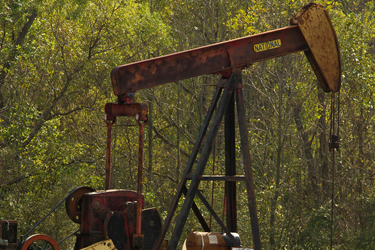Tracers Could End Fracking's Water Contamination Debate
Breakthroughs in chemical tracer technology could help pinpoint the role oil and gas production plays in local water contamination, a controversial and often inconclusive debate.
Researchers say chemical tracers would be particularly useful in instances where water contamination shows up near a fracking site. In such cases, energy industry proponents often argued that metals and chemicals in the water supply did not originate at the fracking site; rather, they were already there.
In western Pennsylvania, for instance, many residents “who said their water changed after oil and gas drilling began in the area, have been told that elements detected in their drinking water – such as methane, boron, arsenic and chlorides – were naturally occurring,” PennLive recently reported.
“While some chemicals and metals are naturally occurring in the groundwater, environmentalists and residents have said the volume of contaminants exceeded amounts that would occur naturally,” the report said.
That’s where chemical tracers come in. The technology may bring some objectivity to these questions.
“Researchers say there's technology to end these debates — and oil and gas drillers have been using it all along. The same chemical tracers the industry uses to see how successful a frack is could tell drillers something if it shows up in nearby streams or well water,” the report said, citing researchers.
The answer could be non-toxic, DNA-based tracers, according to Justine Kmiecik, co-founder and CEO of BaseTrace, a technology startup in North Carolina. "They act like liquid barcodes," she said, per the report. Kmiecik said she would like to partner with the energy industry to test the technology.
“DNA tracers can be used for data production and also tell operators where the leaks are, down to a specific well,” the report said, citing Kmiecik. The technology could have various benefits, according to PennLive:
University researchers have been studying and developing the technology, largely in response to the oil and gas drilling boom across the country. DNA-based tracers could put to rest the debate over whether oil and gas operations are contaminating water, but U.S. operators have been slow to embrace the technology, scientists said.
Environmentalists claim that fracking pollutes drinking water resources, but authorities have questioned that notion in recent months. Fracking supporters celebrated the EPA’s announcement in June that it “did not find evidence that these mechanisms have led to widespread, systemic impacts on drinking water resources in the United States.”
The energy industry says fracking is safe, but environmentalists say fracking does pose a contamination threat. After the EPA announcement, environmental activists criticized the research that supported the decision.
“This study’s main finding flies in the face of fracking’s dangerous reality,” said Rachel Richardson, director of Environment America’s Stop Drilling program, per Politico. “The fact is, dirty drilling has caused documented, widespread water contamination across the country.”
For all of our fracking coverage, visit Water Online’s Produced Water Treatment Solutions Center.
Image credit: "East Texas Oil Well Pump," Ray Bodden © 2010, used under an Attribution 2.0 Generic license: https://creativecommons.org/licenses/by/2.0/

